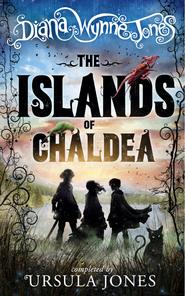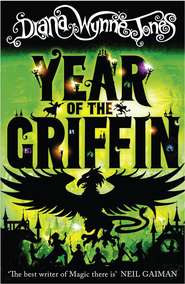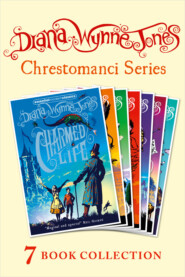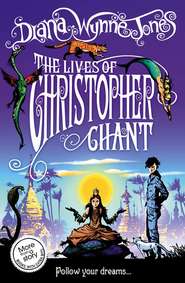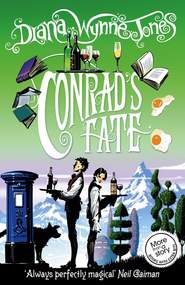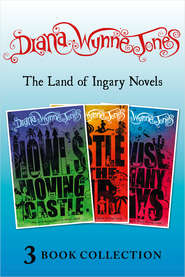По всем вопросам обращайтесь на: info@litportal.ru
(©) 2003-2024.
✖
Eight Days of Luke
Настройки чтения
Размер шрифта
Высота строк
Поля
“They’ve shrunk abominably,” said Aunt Dot. “I shall write to the school and complain.”
“Oh, please don’t,” said David. “It’s not the clothes – really. I think I grew very fast or something.”
“Nobody grows that fast,” Aunt Dot decreed. “Those clothes were a good fit at Easter. You must go straight upstairs and see if you have anything else to wear. You can’t come to supper looking like that.” And she sailed away downstairs.
David went on up to his bare, tidy bedroom. While he searched for clothes, he could not help forlornly wondering whether any of his school friends were having such a cheerless homecoming as he was. He rather thought that most of them had parents and brothers and things who were actually glad to see them. Some of the lucky so-and-sos even had dogs. David would have liked a dog above all things. But the thought of Uncle Bernard being asked to countenance a dog was almost frightening.
The only clothes he could find were smaller than the ones he had on. When Mrs Thirsk rang the gong, David was forced to go down to supper as he was. He met Mrs Thirsk in the passage and she looked him over with utter contempt.
“You do look a proper scarecrow,” she said. “Your Uncle’s going to have something to say about that hair of yours, if I know anything about anything.”
“Yes, but you don’t,” said David.
“Don’t what?” said Mrs Thirsk.
“Know anything about anything,” said David, and he escaped into the dining room, feeling a little better for having annoyed Mrs Thirsk. He had been at war with Mrs Thirsk from the moment he came to live in Uncle Bernard’s house. Mrs Thirsk hated boys. David loathed every inch of Mrs Thirsk, from her blank square face to her blunt square feet. So he smiled a little as he slipped into the dining room.
The smile vanished when he found Astrid there. Astrid was sitting beside the French window with her feet up, because, as everyone knew only too well, her health was bad. Astrid was quite pretty. She had fairish hair and big blue eyes, but her face was always pale and peevish, or it would have looked prettier. She dressed very smartly and told everyone she was twenty-five – she had been telling everyone this, to David’s certain knowledge, for six years now.
At the sight of David, she gave a cry of dismay. “Never tell me you’re back already! Oh, this is too bad! Ronald, you might have warned me!” she said, as Cousin Ronald came in.
Cousin Ronald was carrying a sheet of paper which David recognised as the list of holiday dates that the school had sent last autumn. “It came as a shock to me too,” he said. “But they do seem to give the twentieth here.”
“But you told me the twenty-eighth!” Astrid said indignantly.
Aunt Dot came in at this moment, with her diary open in front of her nose. David drifted away to the other end of the room. “Ronald,” said Aunt Dot, “I have the end of term down here clearly as the twenty-eighth. Why was I misinformed?”
“Trust Ronald to get it wrong!” said Astrid. “If we have to miss going to Scarborough because of this, I don’t know what I shall do. One of my heads is coming on already.”
David, having no wish to hear any more about Astrid’s head, reached out and gently twiddled the knobs of the radio on the sideboard. He was in luck. An announcer said, “Now, cricket. England in the Third Test are—”
“David!” said Aunt Dot. “People are talking. Turn that off at once.”
Sighing, David turned the knob and silenced the announcer. But, at the same moment, Cousin Ronald hurried across the room, saying irritably, “I tell you I’ve no idea how it happened!” and snapped the radio on again.
“Five wickets for fourteen runs,” said the radio.
“Quiet,” Cousin Ronald said severely. “I have to know how England are doing against the Australians.”
To David’s secret indignation, no one made the slightest objection. Everyone stopped talking while the radio told them that England were 112 for eight when rain stopped play. By this time Uncle Bernard had tottered in, still frail from finding David had come home, and Mrs Thirsk was bringing in a tray of thick brown soup. Everyone sat down and began to eat. The thick brown soup tasted thick and brown.
David was very quiet and very careful of his manners. He did not want Aunt Dot to notice he was still in the same clothes, and he did not want Uncle Bernard to notice him at all. For a while he was lucky. Uncle Bernard and Astrid were busy with their usual contest to see who could be illest. Uncle Bernard began it by asking Astrid in a gentle, failing voice how she was.
“Oh, not too bad, Dad-in-law,” she answered bravely. “It’s only one of my heads this evening. How are you?”
“I never complain,” said Uncle Bernard untruthfully, “but I am forced to admit that my lumbago is very troublesome tonight – though it’s these fluttering pains in my chest which are the greatest nuisance.”
“I get those too,” said Astrid. “Dr Ryder gave me some tablets for them, but they’ve made no difference. I’ve been fluttering away all afternoon. Do they make you breathless? I can hardly breathe with them.”
“I gasp for air all the time,” retorted Uncle Bernard, gently and sadly. “My lungs have been in a bad way for years.”
“Oh, so have mine!” cried Astrid, not to be outdone.
At this stage in the contest, David had awarded Astrid four points, and Uncle Bernard three, with a bonus point to Uncle Bernard for never complaining. He rather hoped Astrid would win for once.
“I don’t know how I shall get through the summer,” Astrid said. David gave her another half-mark for that. “These shooting-pains in my shoulders just get worse too.” That was another full point, making Astrid 5½. “Particularly,” she said peevishly, “as it looks as if we aren’t going to Scarborough after all.”
She looked at David then, and David, terrified that Uncle Bernard was now going to notice him, finished his soup as quietly as he could and wished he had not given Astrid that extra half-mark. But Uncle Bernard was moving in to score heavily and had no attention to spare for David just then.
“My dear,” he said, “I was always against your going to Scarborough. You’d never stand the journey.” That made another bonus point. “And for myself,” said Uncle Bernard, “you could take me to Scarborough any number of times and it would do me no good. It would do me no good even if I lived there permanently. No – I prefer to live out my few remaining days quietly here in Ashbury.”
That made a good eight points. Uncle Bernard had flattened Astrid and sat back to enjoy his victory. Astrid had not a word to say, but Aunt Dot, who was never ill and had no patience with anyone who was, snapped crossly, “I must say, Bernard, I wish you’d told me before that you didn’t want to go to Scarborough.”
“My dear, how could I, when I knew a holiday would give you such pleasure?” said Uncle Bernard, scoring a further bonus point for martyrdom and self-sacrifice – though David rather thought that the contest was now over and it was against the rules to go on scoring. But then, he remembered, Uncle Bernard never did play fair.
Meanwhile, Mrs Thirsk took away the soup-bowls and handed out plates of thick brown meat covered with thick brown gravy. David, nibbling it, wondered why people ever complained of the meals at school. School food never tasted this bad, and there was always plenty of it. Mrs Thirsk had never been known to provide enough for a second helping. David thought that perhaps she knew one helping was all anyone could take. Here he looked up and saw Uncle Bernard staring at him. Having polished off Astrid, Uncle Bernard was about to begin on David.
David tried to prevent him, by saying brightly to Aunt Dot, “Aunt Dot, may I go round and see the Clarksons after supper?”
“No, David,” Aunt Dot said, with satisfaction. “I’m glad to say those dreadful Clarksons have moved at last. They tell me the new people are a very much better class of person.”
“Oh,” said David. He felt as if his last hope of enjoying this holiday had now gone. But hope dies hard. “Have the new people any children?” he asked despairingly.
“Good heavens no!” said Aunt Dot. “The Frys are an elderly couple. Mr Fry retired some years ago.” David said nothing. The last hope was truly gone. There was nothing to do but sit and wait for the various miseries in store for him. And they were not long coming. “David,” said Aunt Dot, “I thought I told you to change your clothes.”
David tried to explain that he had now no clothes that fitted him any better. Aunt Dot swept his explanation aside and scolded him soundly, both for growing so inconsiderately fast and for arriving in advance of his trunk. It did no good for David to point out that people of his age did grow, nor to suggest that it was the railway’s fault about the trunk. “When I want your opinion,” said Aunt Dot, “I shall ask for it. This is most vexing. And tomorrow is Sunday, so that it will be Monday before Astrid can take you into town for new clothes.”
This brought Astrid and Cousin Ronald out against David too. “No one,” said Cousin Ronald, “no one objects less than me to spending money when it’s necessary, but this is sheer waste, David.”
Since David was now goaded to the point where he wanted to say that Cousin Ronald always, invariably, objected to people spending money, it was perhaps fortunate that Astrid got in first.
“Town always brings on my head!” she complained. “And shops make me feel faint. You might say you’re grateful, at least, David.”
“I am. Truly,” David protested. “But I can’t help growing.”
All this while, Uncle Bernard had been hovering on the edge of the action, waiting for an opening. Now, just as Mrs Thirsk came to bring pudding, he pounced. “Growing,” he said. “And I suppose you can’t help your hair growing either? You must have it cut at once, boy.” The odd thing about Uncle Bernard was that when he attacked David he never seemed in the least frail or ill. “Hanging round your ears in that unmanly way!” he said vigorously. “I’m surprised they haven’t made you have it cut at school.”
Mrs Thirsk shot David a malicious, meaning look, and David was naturally forced to defend himself. “The other boys all have hair much longer than this,” he said. “No one minds these days, Uncle Bernard.”
“Well I do mind,” said Uncle Bernard. “I’m ashamed to look at you. You’ll have it all off on Monday.”
“No,” said David. “I—”
“What?” said Uncle Bernard. “Do you have the face to contradict me? Boys do not decide the length of their hair, let me tell you. Their guardians do. And boys do not contradict their guardians, David.”
“I’m not really contradicting,” David said earnestly. Because Mrs Thirsk was there, he was desperately set on winning, but he knew that he dared not seem rude or ungrateful. “It’s just that I want to grow my hair, Uncle Bernard. And it’ll cost less money if I don’t have it cut, won’t it?”
“Money,” said Uncle Bernard unfairly, “is no object with me when it’s a question of right and wrong. And it is wrong for you to be seen with hair that length.”






